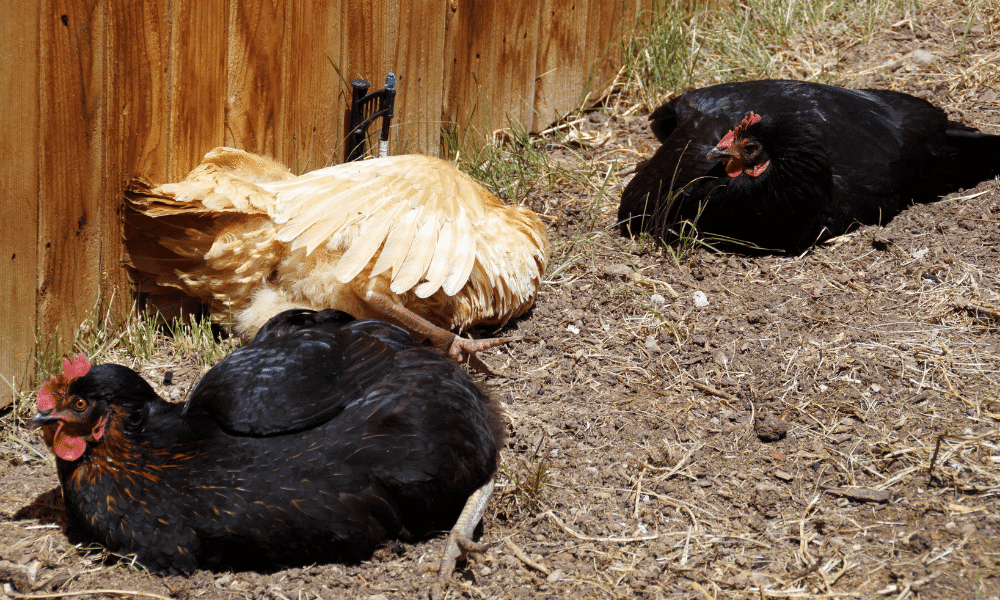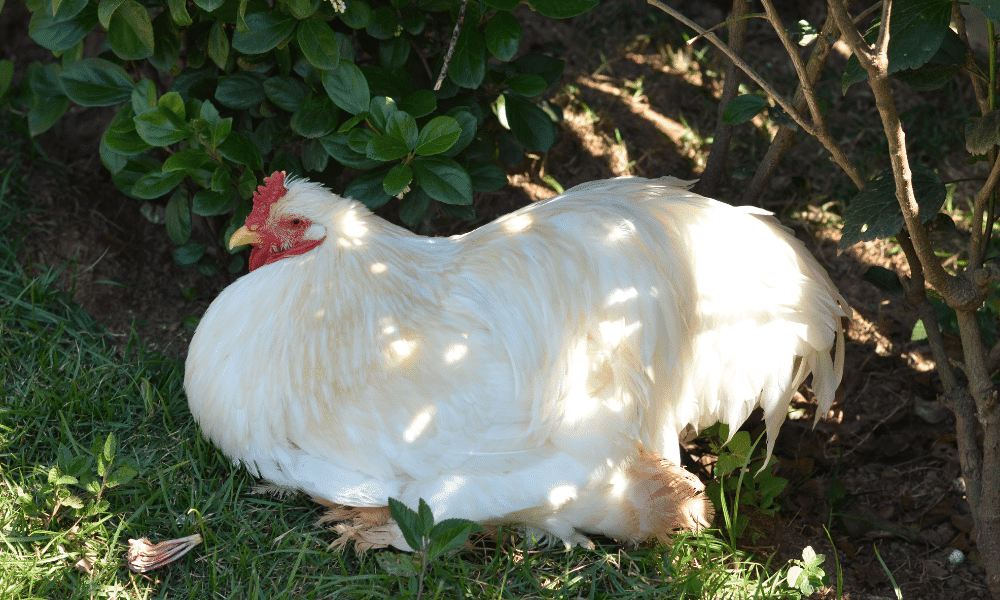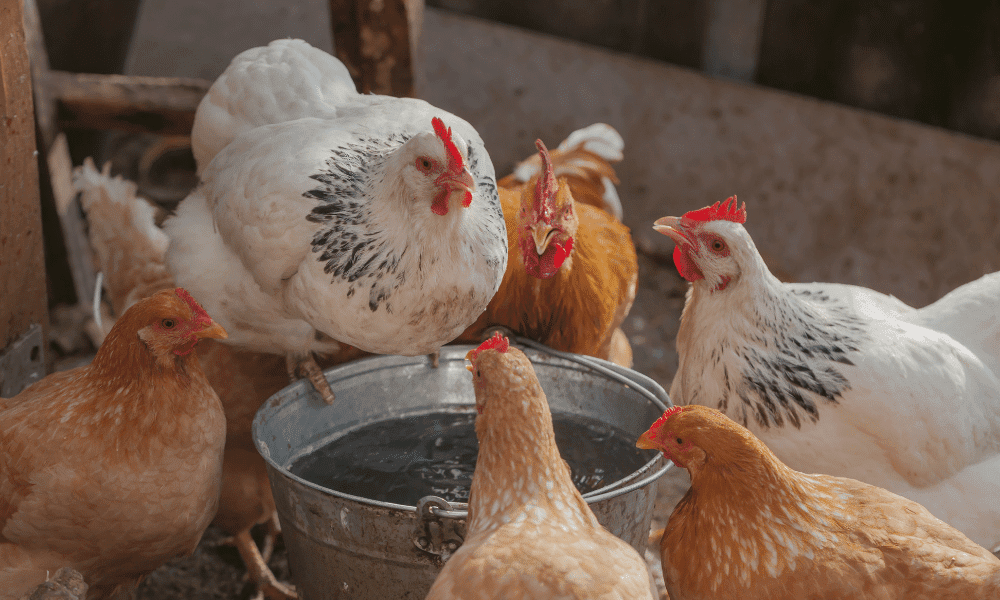There’s no doubt chickens do a good job at handling the heat for the most part. But, although chickens have a few ways they can regulate their body temperatures, just like any animal, they are susceptible to overheating.
As backyard chicken owners, it’s our responsibility to watch over our gorgeous feathered companions and ensure they aren’t getting too hot over those blistering summer days.
Here’s why you should watch out for overheating in chickens, signs your chickens are too hot, and how to cool them down if they’re overheating.
Overheating In Chickens
Overheating, heat stress, or heat stroke in chickens can be a subtle and silent danger that’s often overlooked until it’s too late.
The impact of heat stress on chickens is well known. Even at moderate levels, heat stress can lead to a reduction in egg production in laying hens and will impact the overall well-being of your chooks. At the severe end of the scale, overheating in chickens can even be fatal.
Chickens don’t actually have sweat glands, so they can’t sweat to help cool them down. Plus, their feathers don’t allow them to cool down as easily in a nice breeze as they create somewhat of a barrier. So, instead, chickens will change their behavior to stay as cool as they can when things start to get too hot.
How Hot Is Too Hot For Chickens?

Given the impacts of heat stress on chickens can be quite harmful you should be extra attentive during those hot summer days. But how can you really tell if the hot temperature is OK, or if it’s starting to get too hot for your chickens?
Temperatures from 80-90°F are considered hot, but easily manageable for your chickens – however you may start to see a downturn in egg production!
From 90-100°F, chickens will begin to show behaviors that they are trying to stay cool, but will still be able to regulate their temperature.
From 100-110°F, it’s vital that you start actively trying to cool down your chickens. In most cases, they will be OK, but without proper access to water and shade, they have a high risk of overheating.
If you live in very hot places, like Florida, Louisiana, or Texas, you may sometimes experience temperatures of 110°F or more. In these conditions, you’ll have to take care of yourself as much as your chickens! Do everything you can to keep your flock cool as this is considered highly dangerous, and you will certainly see impacts of heat stress, from health to egg production issues like smaller eggs or laying soft eggs.
Signs Your Chickens Are Too Hot
Since chickens have such erratic behaviors it can be hard to tell if they are doing just fine or if they are actually getting too hot to cope. So, particularly over those hot days in summer, it’s important you keep an eye out to spot anything out of the ordinary.
Luckily, there are a few key behaviors chickens will show when they aren’t coping with the heat. Here are the most common telltale signs your chickens are too hot:
Panting: Panting is one of the most common behaviors when things are a little too hot for your chickens. You’ll see them holding their beaks open, breathing heavily and repetitively in an attempt to cool them down.
Spreading Their Wings: You may also see your chickens with their wings spread out, not tucked into their feathers like they usually have them. By spreading their wings out chickens are able to create more surface area that can come in contact with the air to cool them down.
Lethargy: Like with most animals, when things start to get too hot chickens will become much less active in an attempt to keep their temperatures down. In extreme heat, this becomes very observable, as they often just sit in the shade for very long periods of time.
Decreased Appetite: In the same way that we humans don’t often like having a large meal if it’s a steaming hot day, chickens have a reduced appetite if things are just too hot.
Decreased Egg Production: If it’s a relentlessly hot summer, you’ll find you get fewer and fewer eggs from your flock. This is actually completely normal, as heat stress disrupts the chicken’s normal routines, and so they tend to have reduced egg production. The same effect on egg production occurs if your chickens are too cold too.
How To Cool Chickens Down If They’re Overheating
If temperatures are exceeding around 90°F and you notice some of the warning signs of overheating in your chickens then it’s time to do a quick check of their conditions, and take actions accordingly.
Here are four effective solutions to cool down hot chickens.
Offer A Shady Space

Overheating chickens will immediately start looking for a cool place to retreat to. If they can’t find one, they’ll simply stand idly with their wings spread out.
It’s essential that you provide a shade for the hot chickens to cool down at. A well-ventilated shady coop to hang out in when it gets too hot is perfect. If you don’t have big shady trees in your yard, you can also add a white or reflective cloth along the run to offer additional shady space.
Avoid letting the chickens inside your house if you have air conditioning. The extreme changes in weather can cause them to fall sick.
Fresh Supply Of Cold Water

A continuous supply of fresh cold water will enable your chickens to get rid of the excess heat and cool their body temperature.
If you feel the water isn’t cold enough, try adding ice to their water feeder. Another step you can take is to add electrolytes to the water. This prevents them from getting dehydrated as easily and keeps them cooler for longer. If it’s unusually hot, it can be a good idea to keep the water in their coop at night.
Cold Feed And Treats
Offering cold fruits or vegetable treats can help your chickens cool down and enable them to survive the extreme heat.
One of the most popular cold treats is watermelon, but frozen strawberries or mangos work a treat too.
An old wives tale (or crazy chicken ladies) is to freeze your chicken feed an hour before feeding it to them. This is an effective way of cooling their bodies from within.
Cool Baths
A cool (not cold) bath will immediately bring down your chicken’s temperatures. However, if your chickens aren’t used to this then the shock of the experience may actually do more harm than good. Remember, chickens don’t need wet baths, but they can help in hot weather.
For this reason, it’s actually better to simply offer a cold bathing space or a kiddie pool for your chickens to use at their leisure during those hot summer days.
Remember though, chickens won’t often choose to swim on their own accord, but by adding some stones or a ledge they will become much more inclined. Enable your chickens to stand in the cold water without getting completely wet.
In Conclusion
Chickens are generally able to adapt to harsh climates. However, a hot day in midsummer paired with a lack of shade and cool water can quickly cause your chickens to overheat.
On any day over about 90°F, you should check the warning signs of heat stress in your backyard chickens and start intervening by providing additional shade, cool breeze from a fan, cold treats, and keeping their water fresh and cool.
